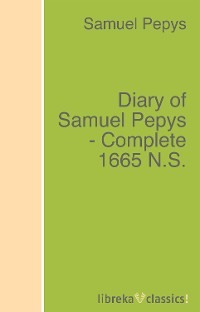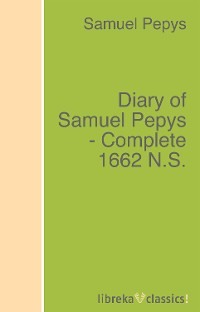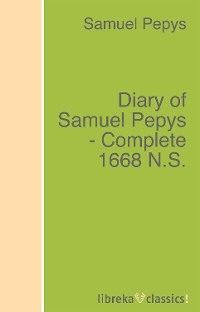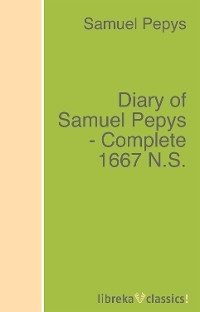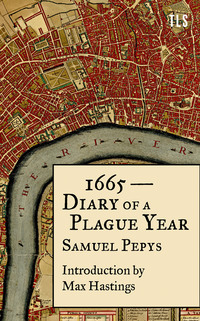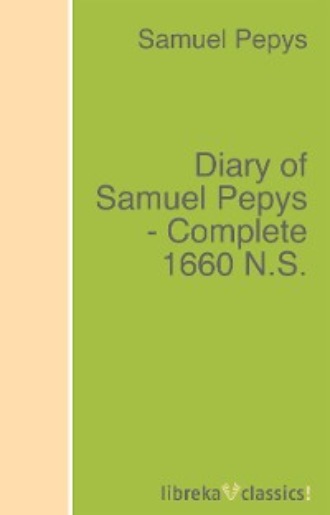
Полная версия
Diary of Samuel Pepys - Complete 1660 N.S.

Titel: Diary of Samuel Pepys — Complete 1660 N.S.
von Augustus J. Thebaud, Charles Kingsley, Henry James, Thomas Hardy, Kate Douglas Smith Wiggin, Joseph Butler, John D. Barry, William Allan Neilson, Henry Rider Haggard, Rudolf Erich Raspe, Paul Heyse, Carl Russell Fish, Tom Taylor, Margaret Pedler, Homer, John Kendrick Bangs, John Burroughs, Juanita Helm Floyd, Maurice Liber, Anthony Trollope, William Morris, Mark Twain, Charles Dudley Warner, Thomas Hobbes, Winfried Honig, Albrecht Dürer, Militia of Mercy . Gift Book Committee, Ella Wheeler Wilcox, Andrew Lang, Katharine Pyle, Sir Samuel White Baker, Frederic William Moorman, the Younger Pliny, Samuel Butler, William Dean Howells, Harold MacGrath, Joseph Crosby Lincoln, Ralph Connor, Various, Oliver Wendell Holmes, Abraham Lincoln, John Galsworthy, Ian Maclaren, Charlotte Mary Yonge, Sir Owen Morgan Edwards, Robert J. C. Stead, Harold Bell Wright, Eleanor H. Porter, Richard Le Gallienne, Ann Ward Radcliffe, Mark Rutherford, John Bunyan, Artemus Ward, John Hanning Speke, James Fenimore Cooper, Edmund Burke, Sir Arthur Conan Doyle, Francis Bacon, Gisela Engel, Edward Samuel Corwin, Washington Irving, Rafael Sabatini, Emma Lazarus, Bishop of Hippo Saint Augustine, Christian Friedrich Hebbel, Adam Smith, Upton Sinclair, Michael Earls, John Hargrave, Charles Hose, William McDougall, Albert Ernest Jenks, marquis de Jean-François-Albert du Pouget Nadaillac, Robert Sewell, 16th cent. Fernão Nunes, 16th cent. Domingos Paes, Inez Haynes Gillmore, Charles Warren Stoddard, Will Irwin, Vivia Hemphill, J. Hampton Moore, Philip Gibbs, Sir Richard Steele, Joseph Addison, L. Mühlbach, Leroy Scott, Mrs. Henry Wood, Ottilie A. Liljencrantz, Algernon Charles Swinburne, Thomas Bulfinch, Bernard Shaw, Confucius, Samuel Pepys, Luís Vaz de Camões, Walter Bigges, Theodore Roosevelt, Émile Gaboriau, fl. 1580. Edward Hayes, Eugène Sue, Earl of Philip Dormer Stanhope Chesterfield, Robert Smythe Hichens, Bliss Perry, Isabella L. Bird, Stewart Edward White, Roald Amundsen, Viscount James Bryce Bryce, Francis Hopkinson Smith, Annie Hamilton Donnell, Mary Wollstonecraft, Jean-Henri Fabre, Marcus Andrew Hislop Clarke, Marietta Holley, W. E. Gladstone, Ellis Parker Butler, Booth Tarkington, G. A. Henty, E. L. Voynich, Anonymous, Francis Leggett, Charles Alfred Tyrrell, Josef Cohen, Jules Verne, Zane Grey, Mary Baker Eddy, Albert Bigelow Paine, Mary Roberts Rinehart, Ouida, Joseph Furphy, Harry Leon Wilson, Sir Hugh Walpole, Edgar Rice Burroughs, Fay Inchfawn, E. Pauline Johnson, Abraham Merritt, James Sheridan Knowles, Herbert George Jenkins, Richard Hakluyt, Georges Victor Legros, J. M. Barrie, Dana Gatlin, Padraic Colum, Lucy Fitch Perkins, Heinrich Heine, Louisa May Alcott, John Ceiriog Hughes, Henry Van Dyke, Laurence Housman, Ludwig van Beethoven, Stephen Leacock, Watkin Tench, E. Nesbit, Edward William Bok, graf Leo Tolstoy, Giacomo Casanova, Oliver Goldsmith, Raffaello Carboni, Orville O. Hiestand, Abraham Cowley, Louis Antoine Fauvelet de Bourrienne, Louis Constant Wairy, Michel de Montaigne, Edward Salisbury Field, Guy de Maupassant, Doris Stevens, Hamilton Brock Fuller, Anna Chapin Ray, Wilkie Collins, Robert Tressell, Victoria Cross, William Guthrie, Alexandre Dumas père, Mary Jane Holmes, Charles Darwin, J. Hartley Manners, Sir James George Frazer, Sir Adolphus William Ward, James Hamilton, Theodore Dreiser, Kathleen Thompson Norris, William Henry Knight, Arnold Bennett, Cosmo Hamilton, Voltaire, Molière, Winston Churchill, Alexander Mackenzie, Joseph A. Altsheler, Maria Edgeworth, Florence L. Barclay, Mary E. Bamford, Frank Harris, Harold Bindloss, Alfred Henry Lewis, Charles Reade, United States. Central Intelligence Agency, Charles Ives, Conrad Ferdinand Meyer, Marion Polk Angellotti, Steele Rudd, Louis Stone, J. C. F. Johnson, Pierre Loti, Henry Martyn Cist, Howard Pyle, Saki, Franz Liszt, H. G. Wells, Dante Gabriel Rossetti, Ben Jonson, William Cowper, Lord Dufferin, Dion Boucicault, Ethel C. Pedley, Robert Alexander Wason, Gertrude Franklin Horn Atherton, O. Henry, Rufus Phillips Williams, Friedrich Heinrich Karl Freiherr de La Motte-Fouqué, Ambrose Bierce, Francis Parkman, Gene Stratton-Porter, Addison B. Poland, John H. Haaren, Giovanni Boccaccio, Henry Handel Richardson, Oliver T. Osborne, Victor [pseud.] Appleton, Nikolai Vasilievich Gogol, Thomas Paine, Maria Thompson Daviess, Gilbert Parker, Lodovico Ariosto, Jean-Jacques Rousseau, Ethel Dench Puffer Howes, Walter De la Mare, P. G. Wodehouse, Van Tassel Sutphen, Esaias Tegnér, Earl of Beaconsfield Benjamin Disraeli, H. E. Marshall, Edna St. Vincent Millay, James Smith, Horace Smith, Henry Edward Krehbiel, Sir Charles Lyell, John S. C. Abbott, Georgina Pell Curtis, Logan Marshall, G. P. R. James, Bram Stoker, John Buchan, Maksim Gorky, Mabel Thorne, Paul Thorne, Henry Kingsley, Mrs. Inchbald, J. Cuthbert Hadden, James Lane Allen, Emma Dorothy Eliza Nevitte Southworth, Lucius Annaeus Seneca, L. M. Montgomery, R. H. Gronow, of Youghal the younger Joseph Fisher, Benedictus de Spinoza, Henry Seton Merriman, J. H. Patterson, Clinton W. Gilbert, Evelyn Blantyre Simpson, F. Marion Crawford, Louis Becke, K. Langloh Parker, Gotthold Ephraim Lessing, Frederick Lawton, Marie Corelli, Frederick Jackson Turner, Lord Frederick Spencer Hamilton, William John Locke, James Elroy Flecker, Richard Wagner, Johann David Wyss, King of France consort of Henry IV Queen Marguerite, Jean François Paul de Gondi de Retz, marquise de Françoise-Athénaïs de Rochechouart de Mortemart Montespan, duchesse d' Charlotte-Elisabeth Orleans, duc de Louis de Rouvroy Saint-Simon, princesse de Marie Thérèse Louise de Savoie-Carignan Lamballe, Mme. Du Hausset, Jeanne Louise Henriette Campan, Lewis Goldsmith, Georges Ohnet, Anatole France, Gustave Droz, Jules Claretie, marquis de Philippe Massa, André Theuriet, Alfred de Musset, Octave Feuillet, Alfred de Vigny, Ludovic Halévy, François Coppée, Paul Bourget, Th. Bentzon, René Bazin, Alphonse Daudet, Charles de Bernard, Hector Malot, Émile Souvestre, Rosa Nouchette Carey, Walter Savage Landor, Coventry Kersey Dighton Patmore, Sir Walter Scott, Maurice Leblanc, Eugene O'Neill, Yei Theodora Ozaki, Dillon Wallace, Eliza Lee Cabot Follen, Benvenuto Cellini, Unknown, Ignatius Donnelly, George Moore, Walter Pater, Wolfgang Amadeus Mozart, Herman Melville, Algernon Blackwood, Anna Katharine Green, Mary Grant Bruce, Mrs. Campbell Praed, Richard Johnson, Ellen Clacy, William Aikman, Sir Edward Shepherd Creasy, Sydney Smith, Simon Newcomb, Henry David Thoreau, J. J. Thomas, Henrik Ibsen, Oscar Wilde, Rex Ellingwood Beach, T. Smollett, Daniel Defoe, Edward Potts Cheyney, Jessie Laidlay Weston, James Legge, Charles Stuart Calverley, Maurice Thompson, Frederick Trevor Hill, Azel Ames, Filson Young
ISBN 978-3-7429-3983-8
Alle Rechte vorbehalten.
Es ist ohne vorherige schriftliche Erlaubnis nicht gestattet, dieses Werk im Ganzen oder in Teilen zu vervielfältigen oder zu veröffentlichen.
THE DIARY OF SAMUEL PEPYS M.A. F.R.S.
CLERK OF THE ACTS AND SECRETARY TO THE ADMIRALTY
TRANSCRIBED FROM THE SHORTHAND MANUSCRIPT IN THE PEPYSIAN LIBRARY
MAGDALENE COLLEGE CAMBRIDGE BY THE REV. MYNORS BRIGHT M.A. LATE FELLOW
AND PRESIDENT OF THE COLLEGE
(Unabridged)
WITH LORD BRAYBROOKE'S NOTES
1660
By Samuel Pepys
Edited With Additions By
Henry B. Wheatley F.S.A.
LONDON
GEORGE BELL & SONS YORK ST. COVENT GARDEN
CAMBRIDGE DEIGHTON BELL & CO.
1893
PREFACE PREVIOUS EDITIONS OF THE DIARY.
1659-1660 JANUARY 1659-1660 FEBRUARY 1659-1660 MARCH 1659-1660 APRIL 1660 MAY 1660 JUNE 1660 JULY 1660 AUGUST 1660 SEPTEMBER 1660 OCTOBER 1660 NOVEMBER 1660 DECEMBER 1660
PREFACE
Although the Diary of Samuel Pepys has been in the hands of the public for nearly seventy years, it has not hitherto appeared in its entirety. In the original edition of 1825 scarcely half of the manuscript was printed. Lord Braybrooke added some passages as the various editions were published, but in the preface to his last edition he wrote: "there appeared indeed no necessity to amplify or in any way to alter the text of the Diary beyond the correction of a few verbal errors and corrupt passages hitherto overlooked."
The public knew nothing as to what was left unprinted, and there was therefore a general feeling of gratification when it was announced some eighteen years ago that a new edition was to be published by the Rev. Mynors Bright, with the addition of new matter equal to a third of the whole. It was understood that at last the Diary was to appear in its entirety, but there was a passage in Mr. Bright's preface which suggested a doubt respecting the necessary completeness. He wrote: "It would have been tedious to the reader if I had copied from the Diary the account of his daily work at the office."
As a matter of fact, Mr. Bright left roughly speaking about one-fifth of the whole Diary still unprinted, although he transcribed the whole, and bequeathed his transcript to Magdalene College.
It has now been decided that the whole of the Diary shall be made public, with the exception of a few passages which cannot possibly be printed. It may be thought by some that these omissions are due to an unnecessary squeamishness, but it is not really so, and readers are therefore asked to have faith in the judgment of the editor. Where any passages have been omitted marks of omission are added, so that in all cases readers will know where anything has been left out.
Lord Braybrooke made the remark in his "Life of Pepys," that "the cipher employed by him greatly resembles that known by the name of 'Rich's system.'" When Mr. Bright came to decipher the MS., he discovered that the shorthand system used by Pepys was an earlier one than Rich's, viz., that of Thomas Shelton, who made his system public in 1620.
In his various editions Lord Braybrooke gave a large number of valuable notes, in the collection and arrangement of which he was assisted by the late Mr. John Holmes of the British Museum, and the late Mr. James Yeowell, sometime sub-editor of "Notes and Queries." Where these notes are left unaltered in the present edition the letter "B." has been affixed to them, but in many instances the notes have been altered and added to from later information, and in these cases no mark is affixed. A large number of additional notes are now supplied, but still much has had to be left unexplained. Many persons are mentioned in the Diary who were little known in the outer world, and in some instances it has been impossible to identify them. In other cases, however, it has been possible to throw light upon these persons by reference to different portions of the Diary itself. I would here ask the kind assistance of any reader who is able to illustrate passages that have been left unnoted. I have received much assistance from the various books in which the Diary is quoted. Every writer on the period covered by the Diary has been pleased to illustrate his subject by quotations from Pepys, and from these books it has often been possible to find information which helps to explain difficult passages in the Diary.
Much illustrative matter of value was obtained by Lord Braybrooke from the "Diurnall" of Thomas Rugge, which is preserved in the British Museum (Add. MSS. 10,116, 10,117). The following is the description of this interesting work as given by Lord Braybrooke
Another work I have found of the greatest value is the late Mr. J. E. Doyle's "Official Baronage of England" (1886), which contains a mass of valuable information not easily to be obtained elsewhere. By reference to its pages I have been enabled to correct several erroneous dates in previous notes caused by a very natural confusion of years in the case of the months of January, February, and March, before it was finally fixed that the year should commence in January instead of March. More confusion has probably been introduced into history from this than from any other cause of a like nature. The reference to two years, as in the case of, say, Jan. 5, 1661-62, may appear clumsy, but it is the only safe plan of notation. If one year only is mentioned, the reader is never sure whether or not the correction has been made. It is a matter for sincere regret that the popular support was withheld from Mr. Doyle's important undertaking, so that the author's intention of publishing further volumes, containing the Baronies not dealt with in those already published, was frustrated.
PREVIOUS EDITIONS OF THE DIARY.
I. Memoirs of Samuel Pepys, Esq., F.R.S., Secretary to the Admiralty in the reigns of Charles II. and James II., comprising his Diary from 1659 to 1669, deciphered by the Rev. John Smith, A.B., of St. John's College, Cambridge, from the original Shorthand MS. in the Pepysian Library, and a Selection from his Private Correspondence. Edited by Richard, Lord Braybrooke. In two volumes. London, Henry Colburn... 1825. 4vo.
2. Memoirs of Samuel Pepys, Esq., F.R.S.... Second edition. In five volumes. London, Henry Colburn.... 1828. 8vo.
3. Diary and Correspondence of Samuel Pepys, F.R.S., Secretary to the Admiralty in the reigns of Charles II. and James II.; with a Life and Notes by Richard, Lord Braybrooke; the third edition, considerably enlarged. London, Henry Colburn.... 1848-49. 5 vols. sm. 8vo.
4. Diary and Correspondence of Samuel Pepys, F.R.S.... The fourth edition, revised and corrected. In four volumes. London, published for Henry Colburn by his successors, Hurst and Blackett... 1854. 8vo.
The copyright of Lord Braybrooke's edition was purchased by the late Mr. Henry G. Bohn, who added the book to his Historical Library.
5. Diary and Correspondence of Samuel Pepys, Esq., F.R.S., from his MS. Cypber in the Pepysian Library, with a Life and Notes by Richard, Lord Braybrooke. Deciphered, with additional notes, by the Rev. Mynors Bright, M.A.... London, Bickers and Son, 1875-79. 6 vols. 8vo.
Nos. 1, 2 and 3 being out of copyright have been reprinted by various publishers.
No. 5 is out of print.
The family of Pepys is one of considerable antiquity in the east of England, and the Hon. Walter Courtenay Pepys
says that the first mention of the name that he has been able to find is in the Hundred Rolls (Edw. I, 1273), where Richard Pepis and John Pepes are registered as holding lands in the county of Cambridge. In the next century the name of William Pepis is found in deeds relating to lands in the parish of Cottenham, co. Cambridge, dated 1329 and 1340 respectively (Cole MSS., British Museum, vol. i., p. 56; vol. xlii., p. 44). According to the Court Roll of the manor of Pelhams, in the parish of Cottenham, Thomas Pepys was "bayliffe of the Abbot of Crowland in 1434," but in spite of these references, as well as others to persons of the same name at Braintree, Essex, Depedale, Norfolk, &c., the first ancestor of the existing branches of the family from whom Mr. Walter Pepys is able to trace an undoubted descent, is "William Pepis the elder, of Cottenham, co. Cambridge," whose will is dated 20th March, 1519.
In 1852 a curious manuscript volume, bound in vellum, and entitled "Liber Talboti Pepys de instrumentis ad Feoda pertinentibus exemplificatis," was discovered in an old chest in the parish church of Bolney, Sussex, by the vicar, the Rev. John Dale, who delivered it to Henry Pepys, Bishop of Worcester, and the book is still in the possession of the family. This volume contains various genealogical entries, and among them are references to the Thomas Pepys of 1434 mentioned above, and to the later William Pepys. The reference to the latter runs thus:—
In illustration of this entry we may refer to the Diary of June 12th, 1667, where it is written that Roger Pepys told Samuel that "we did certainly come out of Scotland with the Abbot of Crowland." The references to various members of the family settled in Cottenham and elsewhere, at an early date already alluded to, seem to show that there is little foundation for this very positive statement.
With regard to the standing of the family, Mr. Walter Pepys writes:—
There is a very general notion that Samuel Pepys was of plebeian birth because his father followed the trade of a tailor, and his own remark, "But I believe indeed our family were never considerable,"—[February 10th, 1661-62.] has been brought forward in corroboration of this view, but nothing can possibly be more erroneous, and there can be no doubt that the Diarist was really proud of his descent. This may be seen from the inscription on one of his book-plates, where he is stated to be:—
Many members of the family have greatly distinguished themselves since the Diarist's day, and of them Mr. Foss wrote ("Judges of England," vol. vi., p. 467):—
The William Pepys of Cottenham who commences the pedigree had three sons and three daughters; from the eldest son (Thomas) descended the first Norfolk branch, from the second son (John Pepys of Southcreeke) descended the second Norfolk branch, and from the third son (William) descended the Impington branch. The latter William had four sons and two daughters; two of these sons were named Thomas, and as they were both living at the same time one was distinguished as "the black" and the other as "the red." Thomas the red had four sons and four daughters. John, born 1601, was the third son, and he became the father of Samuel the Diarist. Little is known of John Pepys, but we learn when the Diary opens that he was settled in London as a tailor. He does not appear to have been a successful man, and his son on August 26th, 1661, found that there was only L45 owing to him, and that he owed about the same sum. He was a citizen of London in 1650, when his son Samuel was admitted to Magdalene College, but at an earlier period he appears to have had business relations with Holland.
In August, 1661, John Pepys retired to a small property at Brampton (worth about L80 per annum), which had been left to him by his eldest brother, Robert Pepys, where he died in 1680.
The following is a copy of John Pepys's will:
His wife Margaret, whose maiden name has not been discovered, died on the 25th March, 1667, also at Brampton. The family of these two consisted of six sons and five daughters: John (born 1632, died 1640), Samuel (born 1633, died 1703), Thomas (born 1634, died 1664), Jacob (born 1637, died young), Robert (born 1638, died young), and John (born 1641, died 1677); Mary (born 1627), Paulina (born 1628), Esther (born 1630), Sarah (born 1635; these four girls all died young), and Paulina (born 1640, died 1680), who married John Jackson of Brampton, and had two sons, Samuel and John. The latter was made his heir by Samuel Pepys.
Samuel Pepys was born on the 23rd February, 1632-3, but the place of birth is not known with certainty. Samuel Knight, D.D., author of the "Life of Colet," who was a connection of the family (having married Hannah Pepys, daughter of Talbot Pepys of Impington), says positively that it was at Brampton. His statement cannot be corroborated by the registers of Brampton church, as these records do not commence until the year 1654.
Samuel's early youth appears to have been spent pretty equally between town and country. When he and his brother Tom were children they lived with a nurse (Goody Lawrence) at Kingsland, and in after life Samuel refers to his habit of shooting with bow and arrow in the fields around that place. He then went to school at Huntingdon, from which he was transferred to St. Paul's School in London. He remained at the latter place until 1650, early in which year his name was entered as a sizar on the boards of Trinity Hall, Cambridge. He was admitted on the 21st June, but subsequently he transferred his allegiance to Magdalene College, where he was admitted a sizar on the 1st October of this same year. He did not enter into residence until March 5th, 1650-51, but in the following month he was elected to one of Mr. Spendluffe's scholarships, and two years later (October 14th, 1653) he was preferred to one on Dr. John Smith's foundation.
Little or nothing is known of Pepys's career at college, but soon after obtaining the Smith scholarship he got into trouble, and, with a companion, was admonished for being drunk.
His time, however, was not wasted, and there is evidence that he carried into his busy life a fair stock of classical learning and a true love of letters. Throughout his life he looked back with pleasure to the time he spent at the University, and his college was remembered in his will when he bequeathed his valuable library. In this same year, 1653, he graduated B.A. On the 1st of December, 1655, when he was still without any settled means of support, he married Elizabeth St. Michel, a beautiful and portionless girl of fifteen. Her father, Alexander Marchant, Sieur de St. Michel, was of a good family in Anjou, and son of the High Sheriff of Bauge (in Anjou). Having turned Huguenot at the age of twenty-one, when in the German service, his father disinherited him, and he also lost the reversion of some L20,000 sterling which his uncle, a rich French canon, intended to bequeath to him before he left the Roman Catholic church. He came over to England in the retinue of Henrietta Maria on her marriage with Charles I, but the queen dismissed him on finding that he was a Protestant and did not attend mass. Being a handsome man, with courtly manners, he found favour in the sight of the widow of an Irish squire (daughter of Sir Francis Kingsmill), who married him against the wishes of her family. After the marriage, Alexander St. Michel and his wife having raised some fifteen hundred pounds, started, for France in the hope of recovering some part of the family property. They were unfortunate in all their movements, and on their journey to France were taken prisoners by the Dunkirkers, who stripped them of all their property. They now settled at Bideford in Devonshire, and here or near by were born Elizabeth and the rest of the family. At a later period St. Michel served against the Spaniards at the taking of Dunkirk and Arras, and settled at Paris. He was an unfortunate man throughout life, and his son Balthasar says of him: "My father at last grew full of whimsies and propositions of perpetual motion, &c., to kings, princes and others, which soaked his pocket, and brought all our family so low by his not minding anything else, spending all he had got and getting no other employment to bring in more." While he was away from Paris, some "deluding papists" and "pretended devouts" persuaded Madame St. Michel to place her daughter in the nunnery of the Ursulines. When the father heard of this, he hurried back, and managed to get Elizabeth out of the nunnery after she had been there twelve days. Thinking that France was a dangerous place to live in, he removed his family to England, where soon afterwards his daughter was married, although, as Lord Braybrooke remarks, we are not told how she became acquainted with Pepys. St. Michel was greatly pleased that his daughter had become the wife of a true Protestant, and she herself said to him, kissing his eyes: "Dear father, though in my tender years I was by my low fortune in this world deluded to popery, by the fond dictates thereof I have now (joined with my riper years, which give me some understanding) a man to my husband too wise and one too religious to the Protestant religion to suffer my thoughts to bend that way any more."


